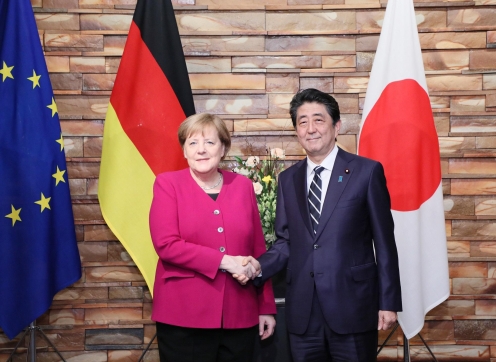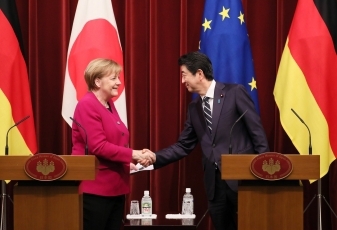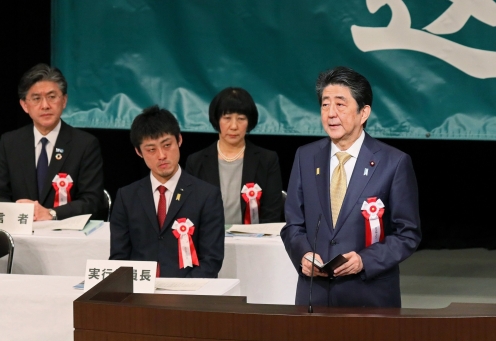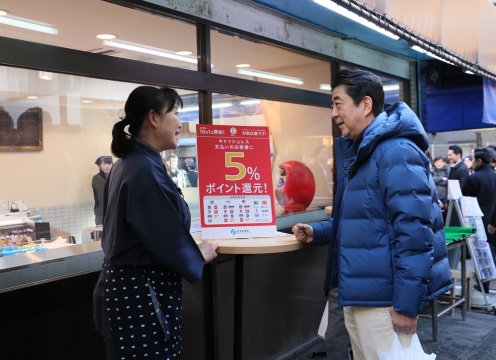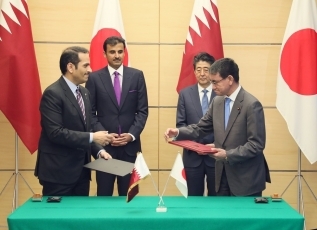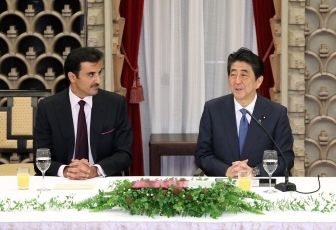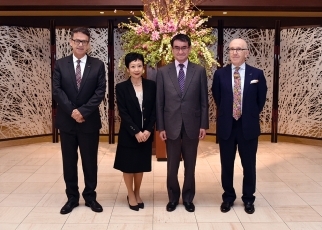Japan-Germany Summit Meeting and Other Events
Cabinet Secretariat, Monday, February 4, 2019
[Provisional Translation]
On February 4, 2019, Prime Minister Shinzo Abe held a summit meeting and other events with H.E. Dr. Angela Merkel, Federal Chancellor of the Federal Republic of Germany, at the Prime Minister’s Office.
Following the salute and guard of honor ceremony, the two leaders held a summit meeting and a joint press conference afterwards.
The leaders then received a courtesy call from members of the Japanese and German business community.
The Prime Minister said in his address at the courtesy call,
“I would like to thank the distinguished members of the Japanese and German business community for gathering today. I wholeheartedly welcome those of you from Germany.
The Economic Partnership Agreement (EPA) between Japan and the European Union (EU) entered into force three days ago. Federal Chancellor Merkel’s visit to Japan at this opportune time sends out a strong message that Japan and Germany will lead this new economic zone. I hope you will make use of the EPA to further expand the business exchanges you have fostered thus far, ranging from food to manufacturing industries and from large to local, small- and medium-sized enterprises. The Government of Japan will support this by leveraging relevant organizations to the greatest extent, including the Japan External Trade Organization (JETRO).
At the summit meeting just held, Federal Chancellor Merkel and I shared the view on strengthening collaboration between Germany, which advances Industry 4.0, and Japan, which advances Society 5.0.
Japan and Germany have a tradition of attaching importance to primarily manufacturing as well as medium-sized and small-scale enterprises. We will lead the creation of a prosperous and clean future society by integrating eco-towns and state-of-the-art technologies, such as autonomous driving, artificial intelligence (AI), and Internet of Things (IoT). This will also be a key topic at the G20 Osaka Summit.
From this perspective, we have in attendance today distinguished members who have contributed to Japan-Germany economic exchanges. I am a proponent of creating a society in which all women shine, as Federal Chancellor Merkel is exemplifying herself in Germany. I am pleased that we are joined by women corporate executives today. I hope to make today’s opportunity a major step forward for further deepening economic cooperation between Japan and Germany.”
Japan-Germany Summit Meeting
Foreign Affairs, Monday, February 4, 2019
On Monday, February 4, commencing at 6:20 p.m. for approximately 45 minutes, Mr. Shinzo Abe, Prime Minister of Japan, held a meeting with H.E. Dr. Angela Merkel, Federal Chancellor of the Federal Republic of Germany, during her official visit to Japan. The overview of the meeting is as follows.
1. Opening remarks
At the beginning, Prime Minister Abe welcomed Chancellor Merkel’s first visit to Japan in approximately two and a half years and appreciated that Chancellor Merkel traveled such a long way only to visit Japan. Prime Minister Abe stated that Japan and Germany have an ever-growing role to play in the world amid widening protectionist movements worldwide and as the United Kingdom heads towards withdrawal from the European Union (EU), and that he hoped to further elevate the Japan-Germany partnership to greater heights towards achieving a rules-based international order and world prosperity. In addition, Prime Minister Abe stated that, towards the G20 Osaka Summit, he would like Japan and Germany to lead initiatives to drive economic growth through promotion of free trade and innovations.
In response, Chancellor Merkel stated that she was glad that she could visit Japan for the first time in two and a half years, that Japan and Germany are leading flag bearers for a rules-based international order, that she looked forward to discussing common issues facing Japan and Germany as well as global issues, that the entry into force of the Japan-EU Economic Partnership Agreement (EPA) sends an important signal to the world, and that she would like to deepen economic as well as science and technology cooperation.
2. International economy and G20
The two leaders exchanged views regarding current international situations related to trade, and shared the view that Japan and Germany will cooperate for maintaining and strengthening a free and open economic system, including World Trade Organization (WTO) reform. The two leaders also exchanged views regarding the United Kingdom’s withdrawal from the EU.
Furthermore, ahead of the G20 Osaka Summit, Prime Minister Abe explained his plan to propose the launching of the “Osaka Track” for discussing data governance at the Summit, focusing on e-commerce. Prime Minister Abe also explained that he would like to make efforts to drive world economic growth by promoting free trade and innovation, while engaging in reducing disparities, and contributing to addressing environmental and global issues, so that a strong message will be sent out.
Chancellor Merkel expressed her support for Prime Minister Abe’s proposal and commented on concrete areas of cooperation, such as climate change, ocean plastic waste, health, Africa, and women’s empowerment. The two leaders then shared the view that they will cooperate towards the successful holding of the G20 Osaka Summit.
3. Bilateral relations
(1) Cooperation for stability and prosperity of the international society
The two leaders welcomed that the negotiations to conclude an agreement on the security of information reached an agreement in principle, and affirmed that they would seize this opportunity to promote cooperation in the areas of security and defense.
The two leaders also shared the view on expanding the horizon of bilateral cooperation for the stability and prosperity of the international society. The two leaders exchanged views regarding concrete cooperation to be implemented, and confirmed that the two countries would cooperate in areas such as achievement of a free and open Indo-Pacific, democratic nation-building in Myanmar in a mutually complementary manner, peace and stability in Africa including the Sahel region and support for its sustainable development, support for the EU accession of Western Balkan countries, and capacity-building assistance in the field of the United Nations peacekeeping operations.
(2) Cooperation in economic field
The two leaders shared the view that they will further advance collaboration between Germany’s Industry 4.0 and Japan’s Society 5.0, that the two countries would lead the Fourth Industrial Revolution, and that they would pave the way for the creation of a prosperous future society that makes use of advanced technologies. The two leaders affirmed that the two countries would strengthen joint research in the areas of autonomous driving, artificial intelligence (AI), and Internet of Things (IoT).
The two leaders welcomed the entry into force of the Japan-EU EPA on February 1, and confirmed that they would further deepen their bilateral economic relations within the world’s largest zone of free developed economies.
(3) Cooperation in cultural field
The two leaders confirmed that they would designate 2021 as the 160th Anniversary of Japan-Germany Friendship and that it would serve as an opportunity to further deepen mutual understanding and exchanges between the two countries.
4. Regional situations
With regard to the North Korean situation, the two leaders shared the view that the complete, verifiable and irreversible dismantlement (CVID) of all weapons of mass destruction and ballistic missiles of all ranges by North Korea is necessary as well as the full implementation of United Nations Security Council Resolutions. In addition, Prime Minister Abe requested Germany’s understanding and cooperation towards the early resolution of the abductions issue and obtained Chancellor Merkel’s support.
Regarding Russia, Prime Minister Abe explained the situation of negotiations towards resolving the Northern Territories issue, while touching upon the recent Japan-Russia Summit Meeting.
2019 National Rally to Demand the Return of the Northern Territories
Cabinet Secretariat, Thursday, February 7, 2019
[Provisional translation]
On February 7, 2019, Prime Minister Shinzo Abe attended the 2019 National Rally to Demand the Return of the Northern Territories, held in Tokyo.
In his address, the Prime Minister said,
“I will offer a few words on the occasion of the 2019 National Rally to Demand the Return of the Northern Territories.
I would first like to offer my heartfelt respect and gratitude to the people in attendance today, and all those around the nation, who work daily with great passion towards the resolution of the Northern Territories issue.
I must say it is extraordinary that the Northern Territories issue has still not been resolved, and Japan and Russia have yet to conclude a peace treaty, even 73 years after the end of World War II. In our summit meeting held two years ago in Nagato, President Putin and I expressed our sincere determination to conclude the peace treaty by our own hands, and since then new negotiations and cooperation never seen before between Japan and Russia have taken place, based on the policy of using a new approach to resolve the issue.
Following the agreement made in Nagato, the former island residents made a special grave visit by airplane for the first time. In last month’s summit meeting in Moscow, I confirmed with President Putin the importance of these initiatives, and agreed that a special grave visit by former island residents by airplane will be implemented this summer. As the former island residents are of advanced age, we will carry out our utmost efforts to allow them to visit the islands, reducing their physical burdens as much as possible.
Regarding the joint economic activities in the Four Northern Islands, our concrete path has become clearer with two consecutive on-site studies, the dispatch of a business mission centered around the private sector, and the roadmap to implement the candidate projects. Based on our perspective of the benefits of the local people and your views, we will continue to work diligently to implement these projects as early as possible in a manner that does not harm the legal positions of either side.
Building on the confidence gained through the continued cooperation, in our summit meeting held in Singapore in November last year, President Putin and I agreed to accelerate peace treaty negotiations based on the 1956 Joint Declaration.
In January, I spent time holding an in-depth, frank discussion one-on-one with President Putin regarding the peace treaty issue during our summit meeting. We gave instructions to accelerate negotiations on a peace treaty by holding the second round of negotiations between our foreign ministers in February along with those between special representatives.
It is not easy to resolve an issue that has remained for 73 years after the end of the war. Even so, we have a duty to follow through. With your earnest wish towards the Northern Territories firmly in mind, we will steadily work on the issues of attribution one step at a time.
We have invited President Putin to the G20 Osaka Summit and will hold a summit meeting in June. We will further promote the relationship of trust and friendship between the people of Japan and Russia, and vigorously advance our joint efforts to identify solutions that are acceptable for both sides. By doing so, we will work in negotiations based on a policy of concluding a peace treaty through the resolution of issues concerning the attribution of the Four Northern Islands.
To make progress in the negotiations, the Government and people must work together, with each citizen increasing their awareness and understanding of the issue. In closing, going forward, I sincerely ask for your strong support and cooperation. Thank you.”
Visit to Togoshi-ginza Shopping Street
Cabinet Secretariat, Saturday, February 2, 2019
[Provisional Translation]
On February 2, 2019, Prime Minister Shinzo Abe visited Togoshi-ginza Shopping Street in Shinagawa City, Tokyo.
The Prime Minister first applied for, received, and charged a prepaid electronic money card at a convenience store and then made a purchase using the prepaid card at a fishmonger’s. Afterwards, the Prime Minister shopped at a florist using the QR code payment system.
After the visit, the Prime Minister said,
“It was my first time using cashless payments, so I was a little nervous, only to discover that purchases can be made really easily. Points-based rebates equivalent to 5% of purchase prices will be introduced in October. I hope everyone takes advantage of this opportunity ahead of welcoming 40 million foreign tourists a year, making the most of cashless payments.”
Japan-Qatar Summit Meeting
Foreign Affairs, Tuesday, January 29, 2019
On January 29, commencing at 3:50 p.m. for approximately 45 minutes, Mr. Shinzo Abe, Prime Minister of Japan, held a meeting with H. H. Sheikh Tamim Bin Hamad Al-Thani, Amir of the State of Qatar during his official working visit to Japan. The overview is as follows. After the meeting, Prime Minister Abe and Amir Tamim attended the signing of the Joint Declaration on the Establishment of a Strategic Dialogue and the memorandum of cooperation.
1. At the beginning, Prime Minister Abe welcomed Amir Tamim’s first visit to Japan in four years and expressed gratitude for the many efforts by Amir Tamim and other Qatar Government officials for the release of the Japanese journalist detained in Syria. He also welcomed that 2021 will be the 50th anniversary of the establishment of diplomatic relations between Japan and Qatar, and stated that he hoped it would be an opportunity to promote cooperative cultural exchanges and appeal for good bilateral relations.
2. Amir Tamim stated that Japan and Qatar’s relations are seen in not only energy, but also various fields, and that he would like to deepen bilateral relations through the 2020 Tokyo Olympic and Paralympic Games and the 2022 FIFA World Cup in Qatar, and that he expects that friendly bilateral relations will be strengthened in various fields.
3. Both leaders welcomed the establishment of the Strategic Dialogue, and confirmed to the existing Joint Economic Committee, Policy Dialogue, and Security Dialogue framework by utilizing further strengthening bilateral cooperative relations. In addition, Prime Minister Abe stated that the Government of Japan decided to relax issuance requirements for multiple entry visas for Qatari citizens toward activating people-to-people exchanges.
4. Both leaders confirmed the importance of bilateral cooperative relations for LNG. In addition, they indicated their hopes for the development of private business cooperation while welcoming the participation of Japanese businesses in infrastructure projects, including for energy, transportation, and power generation, through utilization of Japan’s strong advanced technology.
5. In addition, both leaders exchanged views on the international situation in the Middle East, Asia, and other regions.
Japan-Qatar Banquet at the Prime Minister’s residence
Foreign Affairs, Tuesday, January 29, 2019
On January 29, commencing at 6:45 p.m. for approximately 70 minutes, Mr. Shinzo Abe, Prime Minister of Japan, held a dinner with H. H. Sheikh Tamim Bin Hamad Al-Thani, Amir of the State of Qatar during his official working visit to Japan, following their summit meeting as well as their attendance at the signing of the Joint Declaration on the Establishment of a Strategic Dialogue and the memorandum of cooperation. The overview is as follows.
1. At the beginning, Prime Minister Abe wholeheartedly welcomed H.H. Sheikh Tamim’s first visit to Japan in four years again. He also stated that currently the teams from Japan and Qatar are competing in the AFC Asia Cup in the United Arab Emirates and that he hoped the Qatari team would compete with the Japanese team in the final. He also stated that next year the Tokyo Olympic and Paralympic Games would be held in Japan, that 2021 would be the 50th anniversary of the establishment of diplomatic relations between Japan and Qatar, and that the FIFA World Cup will be held in Qatar in 2022, and that together with the citizens of both countries deepening their friendly relations through culture and sports, he would like to further deepen richer, thicker relations that are not limited to energy.
2. H.H. Sheikh Tamim stated his gratitude for the warm welcome, stated that at the earlier summit meeting it was agreed to strengthen bilateral cooperation in various fields, that Japan is Qatar’s top trade partner and that he would like to further strengthen this strategic connection. He also stated his congratulations for the Japanese team’s advancement to the final at the AFC Asia Cup, and said that he looked forward to the team competing with Japan in the final.
3. The dinner was held in a very harmonious atmosphere.
The Situation in the Bolivarian Republic of Venezuela (Statement by Foreign Minister Taro Kono)
Foreign Affairs, Tuesday, February 5, 2019
1. Japan has repeatedly expressed concerns about the deterioration of the economic and social conditions and the humanitarian crises in Venezuela. Regarding the presidential election held in May, 2018, Japan has repeatedly urged the Venezuelan government to fulfill its accountability to resolve the doubt of the international community about the legitimacy of the election. Japan deplores that the political, economic and social situations have been deteriorating in Venezuela while the Venezuelan government has not duly responded to such requests.
2. The President of the Venezuelan National Assembly, Mr. Juan Guaidó, swore himself in as the Interim President of Venezuela to hold a presidential election. Japan supports the will of Venezuelan people seeking recovery of democracy based on its constitutional order, and once again urges that such will should be respected. Japan, along with the international community, urges that a free and fair presidential election should be expeditiously held.
3. Japan remains concerned that the deterioration of the economic and social situations in Venezuela has seriously affected the Venezuelan people, particularly those in vulnerable situations, and that waves of people fleeing Venezuela are causing a region-wide impact including on neighboring countries. Japan will continue to provide support for the Venezuelan people including those fleeing Venezuela, as well as for neighboring countries affected.
Foreign Minister Kono holds a Working Dinner with the Leaders of Three Japan Houses
Foreign Affairs, Wednesday, February 6, 2019
On February 6, commencing at 7:20 p.m. for approximately 70 minutes, Mr. Taro Kono, Minister for Foreign Affairs of Japan, held a working dinner with President Yuko Kaifu of Japan House Los Angeles, Director General Michael Houlihan of Japan House London, and President Marcelo Mattos Araujo of Japan House São Paulo. The overview of the meeting is as follows.
Minister Kono stated that all three Japan Houses have shown steady development since their opening, and he hoped that the Ministry of Foreign Affairs would continue to effectively advance the Japan House project in cooperation with the three overseas Japan House offices
In response, the three leaders of the Japan Houses reported on the situations of their respective local activities and challenges, and actively exchanged views with Minister Kono about the management of the project.
[Reference] Japan House
Presenting the various appeals and policies of the Japan, Japan House is a brand new hub which aims to broaden the base of those who are well-versed or have an interest in Japan. While offering a “one-stop-service” where a wide variety of information on Japan can be found, along with a Japanese restaurant and retail floor, it aims to promote Japan as a whole from the dynamism of private companies to the charms of the countryside.

























